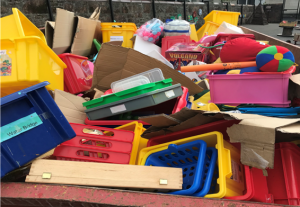There is a saying, variously attributed to early environmental campaigners but likely a much older proverb from a wiser time and place, that goes: “We do not inherit the earth from our parents, we borrow it from our children.”
Whatever its origins, the sentiment rings true and by its maxim we have failed our children and abused their property.
We face a global environmental catastrophe of our own making and it is our children who will bear the brunt of the consequences unless we take radical action now.
We owe it to our children to do everything we can to reverse the effects and curb the damage of climate change and we must do so now. But we also owe it to our children to guide them not to make the mistakes we have, to do better than us, and teach them to value and care for our natural world in a way that we have failed to do.
The best way, perhaps the only way, to understand and appreciate the natural world is to experience it. We have an opportunity now in Scotland to give our children that experience from a very early age through outdoor play and learning.
Increasing the use of quality outdoor play and learning in the early years through outdoor early learning and childcare has significant and far reaching benefits for our children. It supports health and wellbeing as well as social and emotional development.
Learning is also an inherent quality of play, helping to boost creativity, imagination and understanding and can prepare children and young people for wider and more structured learning in school.
A key strand of that learning is learning about the natural world around them by exploring it.
Picking up a stick or a leaf and learning the name of the tree it fell from, identifying the creepy crawlies that live in the ground and how to respect their homes. To admire the wildflowers that grow and know the season that they herald, to tread carefully through the undergrowth and know the birds that glide above them.
These are rich experiences for children and are available as readily in city parks and urban woodlands as in rural and coastal places. We see this happening now in the outdoor nurseries we are developing in Castlemilk and Garscadden woods and Baltic Street Adventure Playground in Glasgow. There are fantastic examples from a host of early years settings using their existing playground or garden spaces to move experiences outdoors, and childminding groups running activities in local public land, woodland and beaches.
Playing and learning outdoors can and does instil in our children an understanding and deep enjoyment of the natural world and nurtures in them the will to protect it. The expansion of free childcare spaces in Scotland is an opportunity to make these life-enhancing experiences available to all our children.
There are additional environmental benefits too. As a shift in public discourse has drawn attention to the blight of plastic waste and pollution on our environment, the prevalence of plastic toys in early years environments has also been highlighted.
 In this snapshot from a nursery in South Ayrshire, after they cleared out their plastic toys, a whole skip’s worth of mostly plastic materials was removed and, of course, recycled.
In this snapshot from a nursery in South Ayrshire, after they cleared out their plastic toys, a whole skip’s worth of mostly plastic materials was removed and, of course, recycled.
From existing examples of outdoor early years settings, we know that children do not need a lot of plastic, often specific-use, toys to have fun. A stick found in the woods can be a magic wand and a fallen log can be a fairy kingdom. Loose parts play – the use of recycled and reclaimed junk often made from natural materials – is a rewarding and enriching play experience for children. An outdoor space with bits of wood, old rope, tires and barrels allows children the joy of creativity, imagination and invention in their play. But it can also teach them about materials, their usefulness and what happens when they have been used. The things our children play with can spark a conversation with them about how the materials we use, and how we use them, affects our environment.
The world we live in belongs to our children. The parks, gardens, woodlands, hillsides, meadows, beaches and all the little patches of grass in Scotland belong to them. We must take immediate action on combating climate change. But we must also take our children outside to play in and enjoy their natural world to ensure they look after the Earth for their children a lot better than we have done for them.
Rachel Cowper is the Programme Lead for Thrive Outdoors. Find out more about our work here.

Today (14th May 2025) a new £3 million Bright Start Breakfasts Fund will open to applications. The fund will expand access to breakfast clubs for primary school children by combining provision of healthy and nutritious breakfast food with before-school supervision or childcare enabling early drop off for parents to support them to work or study.
Read More
More funding has been announced for the Scottish Government’s Autistic Adult Support Fund and is available to third sector organisations providing services to autistic adults – promoting wellbeing and helping them to understand what neurodivergence means for them. Since 2023, the Scottish Government has allocated £1.5 million to 15 organisations, including those helping autistic adults
Read More
People with learning disabilities will be supported to reach their full potential through a £1.6 million Scottish Government fund. The Learning Disability Support Fund will be available to third sector organisations to enable them to promote equality and inclusion and improve access to education, health services and social activities for people with learning disabilities. The
Read More